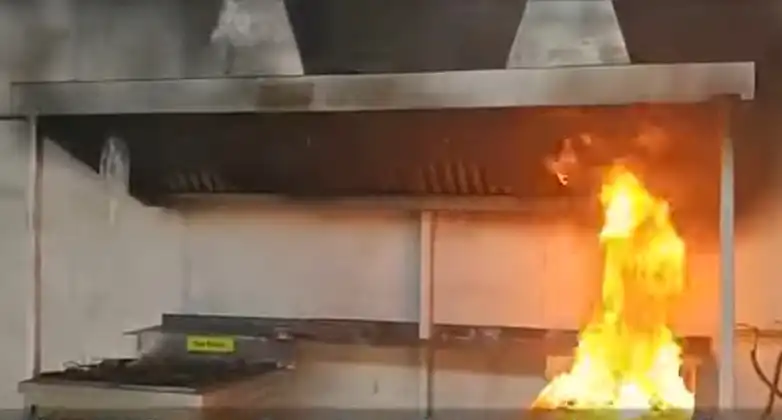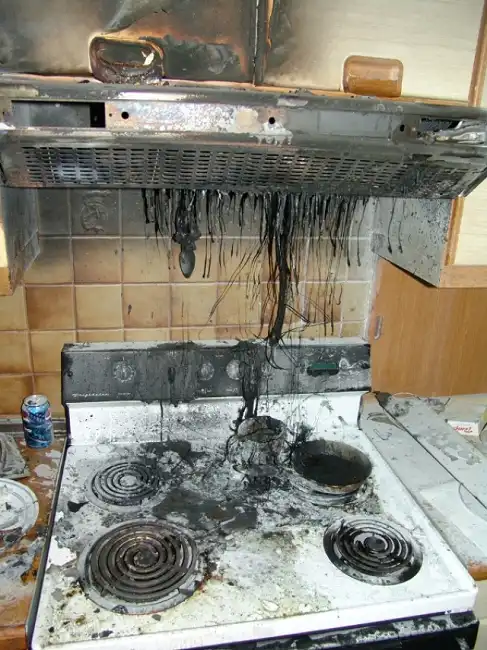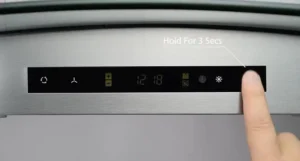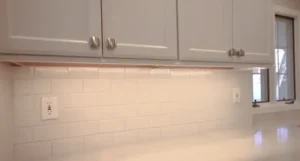Range hoods are necessary for kitchen exhausts, especially if you are a cookaholic. No matter whether that fact is relevant or not, every household should have one.
Why? Because it not only keeps the heat and fume at bay but also removes the grease and smoke keeping your kitchen free of them. Nobody wants a black end and sticky kitchen. Right?
But as any kitchen appliance goes, especially if it is sitting on top of your stove, you get the tingle feeling about fire safety. Can a range hood catch fire?
Well, it generally doesn’t. But there are instances where a range hood can catch fire. These are grease buildup, blocked filters, and electrical wiring malfunction. Let’s talk about them and what you should do to avoid it.

Reasons Why Range Hood Might Catch Fire
Range hoods are normally safe. They don’t catch fire if maintained properly. But there are times when it catches fire. Here are the few times and reasons when your range hood might catch fire.
Grease Buildup In The Range Hood
Yes, range hoods also remove the grease from all the cooking and heating. With time, this grease builds up inside the range hood and also the ducts. As the range hood carries heat along with the fume, sometimes it overheats and might catch fire.
Jammed Filter
Another grease buildup that is more easy to build up in the range hood is the filters. They get clogged up pretty fast and you can take them off and wash them. If you don’t, you risk yourself starting a fire on the range hood. If somehow your stove flames run up to the range hood or the hood is too low, then it’s going to be like Tom and Jerry from the 90s and catch fire like dynamite.

Overheating Fan And Motor
Using your range hood for longer than usual in high heat might cause your fan and motors to overheat. And if this keeps on going, the motor might burn out and cause a fire. It’s unusual but happened before to a lot of people.
Wiring Faults
Range hoods are built to withstand heat, grease, and fume. But if there is a factory defect, and the wiring is faulty, it might start a short circuit. Which will lead to a fire. If you get a faulty unit, you will notice that the hood isn’t functioning well. The best thing to do is get it checked out and changed.
No matter what the trouble is, if your range hood catches fire, just unplug it from the power if possible. Then dial 911. Make sure you leave your house if the fire starts to grow. Don’t stay inside to control it.
Frequently Asked Questions and Answers – FAQs
Can I leave range hood on all night?
Range hoods work instantly when turned on. So whenever you are cooking, it will keep on running and venting out the fume, smoke, and grease from the stove. Leaving it on after you finish cooking for 30 minutes is fine. But keeping it on all night is a bit overkill. It will just consume electricity and do nothing good at all.
Can a range hood overheat?
Yes. If the filters aren’t cleaned regularly or the fan blades are clogged up, the range hood will overheat.
How much heat can a range hood handle?
Range hoods can handle temperatures up to 550 degrees Fahrenheit. Above that the range hood will start to malfunction or even catch fire.
How long do range hoods last?
The average lifespan of a range hood is 15 years give or take. But some can run up to 20 years if maintained regularly.
Conclusion
Range hoods are supportive and essential kitchen appliances. Sure you might have exhausts and vents in your home, but range hoods are especially designed to keep your kitchen look clean and tidy. Also, it keeps the heat at bay so you don’t get a heat stroke while cooking your holiday meals. So make sure you take care of it like it does to you.



![Read more about the article [Answered] How Many Amps Does a Cooker Hood Use?](https://kitchenhoodcare.com/wp-content/uploads/2023/10/How-Many-Amps-Does-a-Cooker-Hood-Use-300x161.webp)